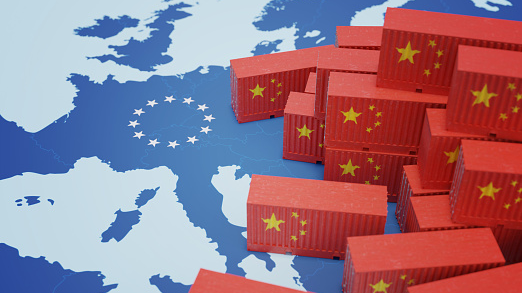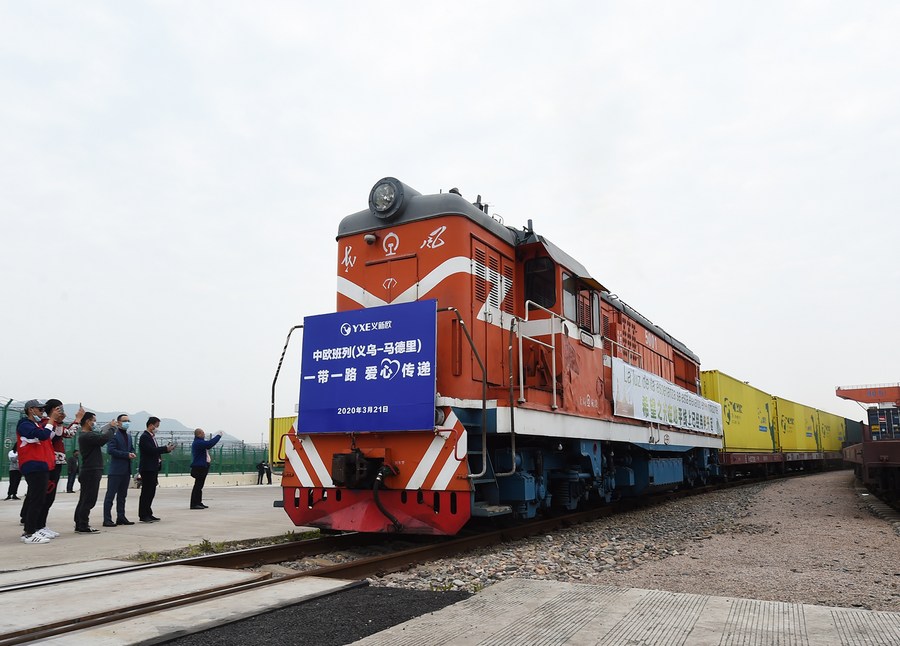
Editor's note: Bobby Naderi is a London-based journalist, guest contributor in print, radio and television and documentary filmmaker. The article reflects the author's opinions and not necessarily the views of CGTN.
However faintly, the EU-China Comprehensive Agreement on Investment (CAI) appears to be in limbo after Brussels announced that it had suspended efforts to ratify the agreement as relations between the trade partners sour amid tit-for-tat sanctions.
Ironically, it seems all too obvious and appropriate that the historic accord is still not going away. While it is true that the major investment agreement lacks all-out support in the EU owing to political speculations, it does have its merits and supporters. Put bluntly, events so far this year are increasing the likelihood that it is here to stay, and it will be ratified, whatever the pointless political discussions and disputes may be.
No replication
We all know what the accord is. Brussels and Beijing signed the CAI in 2020 to guarantee a stable framework of conditions for trade and investment in each other's markets. The accord was signed after seven years of marathon negotiations, and to enter into force, it must be ratified by EU member states and the European Parliament, where it faces opposition by some politicians.
The skeptics have been raising doubts about the CAI for several months now, even calling on the EU to ditch it. This is while the deal cannot be replicated, and what's more, the EU cannot replace it in these difficult times. Over the years, the deal has got itself a huge following among trade and business communities, and to this day, it is almost an academic exercise for a large community of European companies and investors for its several valuable attributes.
First, and perhaps most significantly, China is the second-largest economy in the world and the EU's major trading partner. Sanctions will cease when the CAI is finally ratified, which is likely to occur soon. On balance, political sanctions are in the spoiler's role, interfering in Brussels' plans for the speedy ratification of the accord amid the pandemic and its disruptive impact on European economies. The agreement grants EU investors greater access to China's market, while many already have a presence there.
In our collective memory, the German chancellor, Angela Merkel, once said that the Chinese market is especially important to German carmakers and manufacturers who have a large presence in the country. It seems obvious enough that the pact will be ratified by any means necessary, as it offers a new opening to China's vast market that will further benefit European companies and investors.
This is because China has over the years ensured fair treatment for EU companies, where they are allowed to compete on a level playing field with their Chinese counterparts. These commitments include transparency of subsidies, investment protection, dispute settlement, climate, and rules against forced technology transfer.

A China-Europe freight train carrying two containers of medical supplies and other goods bound for Madrid, Spain departs the city of Yiwu in east China's Zhejiang Province, March 21, 2020. /Xinhua
A China-Europe freight train carrying two containers of medical supplies and other goods bound for Madrid, Spain departs the city of Yiwu in east China's Zhejiang Province, March 21, 2020. /Xinhua
Second, China is a reliable global player and has many other trade partners. It operates within the free-market economy systems, making it harder for a single actor or political entity to influence its trade and investment pacts. While some domestic regulations may be a peril, the CAI's free trade nature and stable framework of conditions for investment should separate it from the impulses of any domestic policy.
Negative sum game
It is said sanctions and retaliation are a negative-sum game. But, unfortunately, the EU and China went for it, seemingly in a game of power politics. In March, the EU imposed sanctions on Chinese officials involved in Beijing's policy on Xinjiang. In response, China imposed counter-sanctions that targeted members of the European Parliament and others.
But punitive diplomacy only goes so far. The only outcome of the game of sanctions is that China and the EU have stopped their cooperation in certain areas. Perhaps, they are determined to signal how much value they put on national sovereignty and human rights issues. But they both stand to lose if they don't stop the political game of escalation. Sanctions have a boomerang effect and may harm both parties with economic side effects.
To put it into perspective, the CAI happens to be at the very forefront of the Sino-EU strategic partnership. As a trade and investment opportunity, it cannot be missed. As more and more EU businesses and investors begin to support it, its importance is sure to increase.
At this stage, anyone who is seriously thinking about investing in China should look at all of the non-existent alternatives before raising doubts about the accord. The alternative is strategic confusion and more mutual economic and trade loss with no clear end in sight.
The situation, then, is quite simple. As the post-pandemic world unfolds, the best time for the political class in Brussels to ratify the accord is now. With its economy projected to become the world's largest during this decade, China is the future, and the sooner the EU ratifies the globally accepted CAI, the higher its returns will be.
(If you want to contribute and have specific expertise, please contact us at opinions@cgtn.com.)

